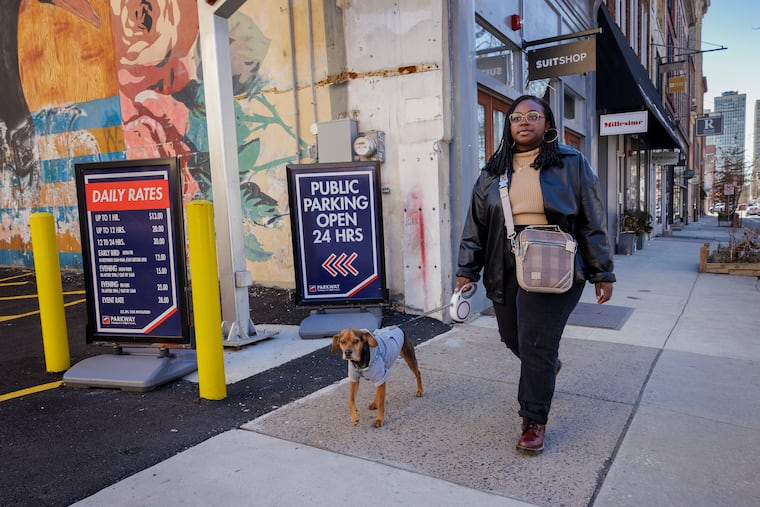These Philadelphians got rid of their cars in the last year. They haven’t looked back.
“Now that I’m forced to walk, I’m seeing the city more than I did before," said one newly carless resident. She used to pay about $400 a month on her car payment and insurance.

Dajé Walker’s Hyundai Elantra was stolen from a Brewerytown parking lot in July, only to be found a week later on the side of a local highway.
The car that Walker had driven for three years was “in shambles,” Walker said, and the insurance company deemed it a total loss.
“I had that existential crisis moment where I was like, ‘Do I need a car or do I want a car?’” she said.
Around the same time, Walker, 28, got a new, completely remote job as a project manager. The news sealed her decision: She took the insurance payout of about $15,000, putting some of the money in savings and using the rest to move from Brewerytown to Old City, and never looked back.
She no longer has to set aside $300 a month for her car payment and another $100 for insurance. When she recently moved to Old City, she didn’t have to worry about securing a convenient and safe parking spot, which can cost at least $250 a month at private lots.
The benefits of Walker’s new lifestyle aren’t just financial, though — they’re mental and physical, too.
“My car, it was a complete crutch,” Walker said. “Now that I’m forced to walk, I’m seeing the city more than I did before.”
She feels like she’s “seeing the sun more often” on regular walks to judo class, City Fitness, and social gatherings, she added. For outings farther away that require taking the bus, “it’s more time for me to be zen or read a book on the way there.”
After a surge in car-buying statewide at the height of the pandemic, there are signs that some Philadelphians like Walker have made the decision to do away with their cars in recent years, bucking larger trends.
In 2022, more than 638,000 passenger vehicles were registered in the city, about 24,000 fewer cars than were registered here a year prior, according to the most recent state data. That represents a 3.6% decline in registered vehicles over a period when the city’s population decreased 1.4%, the largest one-year drop in 45 years.
The latest registration data was captured before the price of car ownership skyrocketed.
» READ MORE: Philly has the largest jump in average cost of car insurance in the country in 2024
In 2023, drivers who owned a new car paid more than $12,000 a year on average, a more than 13% increase from the prior year, according to AAA, which accounted for the costs of car payments, gas, maintenance, and insurance.
In the last year, car insurance premiums nationwide have far outpaced inflation, increasing 20% on average. Philadelphia-area residents told The Inquirer last month that they’ve recently been quoted rates as much as 100% higher than what they were previously paying. A recent Bankrate report found Philadelphia-area residents paid $4,753 a year on average, and the region saw the largest increase of 26 major metro areas last year in terms of average comprehensive coverage costs.
What you gain by going carless
So far across the country, the increased cost of car ownership “does not appear to affect whether people are buying or what people are buying,” said Greg McBride, chief financial analyst at Bankrate. “A much longer-term trend is that American consumers have increasingly been moving away from smaller compact vehicles to larger SUVs and trucks.”
Philadelphia, meanwhile, is consistently ranked among the metro areas with the lowest car ownership and is known for being one of the best cities to live in without a car (though historically not all neighborhoods have the same access to public transit).
Some residents like Walker also cited a psychological cost to car ownership in the city. Even before she became one of the tens of thousands of residents who had their cars stolen last year, she was constantly worried about her car. And residents who choose to park on the street — which is free in some areas and $35 a year in others — may have a difficult time finding an open spot depending on the neighborhood and what time of day they’re coming home.
Of course, the ease of driving and parking in the city is all relative.
“Philly is really hard to have a car,” said Pascale Questel, 30, a copywriter who moved to Brewerytown from Florida three years ago. Every time she walks her dog, she checks on her Honda, which she parks on the street, and her Hyundai Elantra was stolen last year.
Last year, Leo Walsh, 31, of West Philadelphia, sold his Subaru Forester, a car he said he felt like had become “an extension of me.” He had even lived out of it three months on a solo cross-country road trip.
He suddenly realized he was resorting to driving at the smallest inconvenience, including for trips to Trader Joe’s a couple miles away or on rainy days when he didn’t feel like biking or walking to the trolley.
He didn’t end up getting any money for his car — it was a 2004 and needed work — but he is saving on insurance, gas, and maintenance. And there’s an “unquantifiable” benefit, too: how it feels every day to see the faces of passersby as you bike past them, or to end your commute by thanking a conductor instead of slamming your car door shut, alone.
“I have fallen more in love with the city now, just biking and getting to know all the streets,” said Walsh, who works for Jawnt, a technology company that provides transit benefits for some city employers. “You just don’t get that in a car. You’re in your little bubble.”